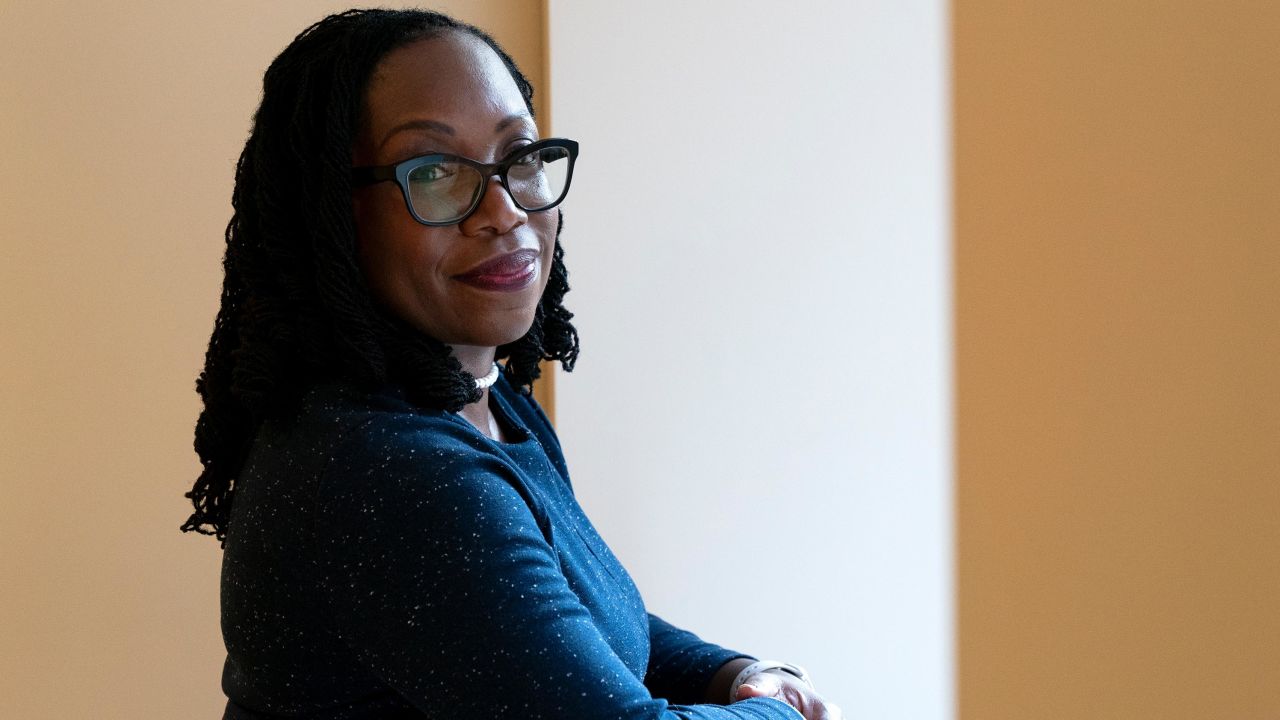Like most every other nominee for the Supreme Court, Judge Ketanji Brown Jackson has been participating behind closed doors in so-called “moot court” sessions to prepare for her upcoming hearings, according to a source familiar.
Under the system, allies play the role of hostile senators, launching questions or comments meant to rattle a nominee or throw her off course.
At these sessions – sometimes referred to as “murder boards” due to their intensity – Jackson will likely be grilled on allegations Republicans have already floated: That she is soft on crime.
Her supporters believe the Republican strategy during the hearings is two-fold: Raise questions about Jackson’s experience as a judge, public defender, her time spent on a federal commission that ultimately slashed drug sentences, and briefs she crafted supporting detainees at Guantanamo Bay. After that, they could pivot to attack the policies of the Biden administration in general.
But Jackson – who saw a preview of some similar questions the last time she went before Congress less than a year ago – will be prepared.
Already, for example, Missouri Republican Sen. Josh Hawley launched a Twitter thread on Wednesday charging that Jackson’s record reveals a “pattern” of letting child porn offenders off the hook for their appalling crimes, both as a judge and as a policymaker.
“This goes beyond ‘soft on crime,’” he charged.
In its first flash of anger concerning her nomination, the White House blasted Hawley for the attacks. A White House spokesman called the tweets “toxic and weakly-presented misinformation that relies on taking cherry-picked elements of her record out of context – and it buckles under the lightest scrutiny.”
Senate Judiciary Chairman Dick Durbin said Sunday that Hawley was “wrong” and “unfair in his analysis.”
“Judge Jackson has been scrutinized more than any person I can think of. This is her fourth time before the Senate Judiciary Committee. In three previous times, she came through with flying colors and bipartisan support, the last time as soon as just last year,” the Illinois Democrat said on ABC’s “This Week.”
A CNN review of the material in question shows that Jackson has mostly followed the common judicial sentencing practices in these kinds of cases, and that Hawley took some of her comments out of context by suggesting they were opinions, rather than follow-up questions to subject-matter experts.
Senate Minority Leader Mitch McConnell took a more constrained approach in a floor speech vowing that the hearing will be a “serious and dignified process.” But the Kentucky Republican took aim at the fact that President Joe Biden has lauded Jackson for the professional diversity she brings as someone who once worked as an assistant public defender.
“Nobody is saying that public defenders ought to be disqualified from judicial service,” McConnell allowed. But he condemned the Biden administration’s “intentional quest to stuff the federal judiciary full” with nominees of this “one perspective.”
“Even amidst the national crime wave, a disproportionate share of the new judges President Biden has nominated share this professional background that liberals say gives special empathy for criminal defendants,” he said and added that the President “is deliberately working to make the whole federal judiciary soft on crime.”
McConnell, who in June 2021 voted against Jackson’s confirmation to the US Court of Appeals for the DC Circuit, said Sunday that he hadn’t decided how was going to vote on her Supreme Court nomination.
“I’m willing to listen to the testimony, that’s why we have hearings,” McConnell said on CBS’ “Face the Nation” when asked if he was open to voting for the nominee.
Jackson’s supporters believe that such inquiries – instead of derailing her confirmation – could, instead, serve to highlight her expansive understanding of the intricacies of the criminal justice system while at the same time showcasing the fact that no other member of the current court has a similar expertise. In addition, any talk about the system could allow Jackson to explain her own family’s experience straddling the system – something that could resonate with the public.
In the end, by attacking Jackson as soft on crime, Republicans could rally their base in the lead up to the midterms but do little to stop her confirmation.
Personal story
At the White House last month – in her first public comments about the subject – Jackson revealed that she had an uncle, Thomas Brown Jr., who got “caught up,” she said, in the drug trade and received a life sentence.
Brown, who has since died, was her father’s brother and sources say she hardly knew him. But in 2005, when she was serving as an assistant public defender, he reached out to his niece to see if she could help him get out of prison.
She concluded he had exhausted his legal appeals, but eventually forwarded his file to a friend who worked for a powerful law firm that handled clemency petitions. According to a source familiar as well as a spokesperson for the firm, Wilmer Hale, Jackson didn’t have much more involvement in the case.
But newly released documents portray how other members of the Brown family worked ferociously behind the scenes – like many Americans in similar situations – trying to get him released, arguing that he had been victim of too harsh a sentence for non-violent, low-level drug offenses.
“A life sentence would be understandable for criminals like Jack the Ripper or Charles Manson, as they were murderers,” one family member wrote in a letter addressed to President Barack Obama and the Office of the Pardoning Attorney. “The most heartbreaking thing about Thomas’s punishment is that anyone who knows him knows he does not deserve this,” the person – whose name was blacked out – wrote.
Carl Nichols, Brown’s clemency lawyer, also argued in a letter to the Pardon Attorney in October 2014 that his client, a 75-year-old Vietnam vet in declining health, who had already served 25 years of a life sentence, should receive a commutation. Nichols noted that under Justice Department’s current sentencing policy his client would have received a far shorter sentence.
In a 13-page letter, Nichols said that Brown has long since paid his debt to society and should have his sentence commuted as a “fitting and humane exercise of the President’s clemency power.” Brown ultimately received clemency from Obama.
Nichols – no bleeding heart liberal – who had clerked for a conservative appeals court Judge Laurence Silberman as well as the right leaning Justice Clarence Thomas, would go on to be nominated by President Donald Trump in 2018 for a seat on the US District Court for the District of Columbia.
At the White House ceremony in February, Jackson – perhaps knowing that she might be asked about her incarcerated uncle at her confirmation hearing – clearly wanted to make an important point. She stressed that even though one family member had been sent to prison, there was another side to her family’s history.
“Law enforcement also runs in my family,” she announced. “In addition to my brother, I had two uncles who served decades as police officers, one of whom became the police chief in my hometown of Miami, Florida,” she noted. At her hearing, Democratic senators are likely at some point to refer to the fact that she has received an endorsement from the Fraternal Order of Police.
Assistant public defender
As Democrats highlight Jackson’s unique family history, Republicans may choose to shift attention to her time served as an assistant federal public defender in the District of Columbia.
The issue came up less than a year ago during her confirmation hearing for a seat on the US Court of Appeals for the District of Columbia Circuit.
Out of the gate, Republican Sen. Tom Cotton of Arkansas asked her if she had “ever represented a terrorist at Guantanamo Bay.”
She said she had while serving as a public defender.
But Democratic Sen. Mazie Hirono of Hawaii asked questions that allowed Jackson to explain why she had chosen public service.
“I remember thinking very clearly that I felt like I didn’t have enough of an idea of what really happened in criminal cases, and I wanted to understand the system,” Jackson said.
It could be challenging for Republicans to make a dent in Jackson by portraying her as soft on crime, when she, like Nichols who had represented her uncle, was doing her job to vigorously defend her client. As she said in 2021, “as a lawyer I was focused on my client’s interest, I was doing what advocates do.”
Record on child sex offenders
She will likely also be asked about her time serving as a commissioner on the US Sentencing Commission, an independent agency that establishes sentencing policies.
In his tweets Hawley seized on what he called Jackson’s pattern as a commissioner and later as a federal judge suggesting she had let child porn offenders “off the hook.”
Hawley pointed in particular to a series of cases she handled on the bench where he said she deviated from federal sentencing guidelines when sentencing child porn offenders.
A White House spokesman noted that in the overwhelming majority of her cases involving sex crimes, her sentences were “consistent or above what the government or U.S. Probation recommended.”
Hawley also quoted comments Jackson made as she served on the commission during a February 15, 2012, hearing on child pornography.
The remarks represent a small portion of her questions and responded specifically to testimony offered by the many experts who testified. A review of the hearing transcript and interviews with two experts who testified belie the claim that Jackson showed leniency toward child pornography during the daylong session.
Hawley, and Republican Sen. Mike Lee of Utah signaled that they will demand answers during her hearing.
“We need real answers,” Lee tweeted.
Drug sentences
Republicans might point to the fact that a seven-member body of Sentencing Commission unanimously decided to lower federal drug sentences.
But Democrats will be quick to point out that one of the commissioners was Judge William H. Pryor Jr., a conservative judge who sits on the 11th US Circuit Court of Appeals. Another was Judge Dabney L. Friedrich whom Trump went on to nominate to United States District Court for the District of Columbia. Another was Judge Ricardo Hinojosa who, an appointee by Ronald Reagan to the United States District Court for the Southern District of Texas.
Already, Republicans are going through thousands of documents from her time at the commission looking for evidence that she was soft on crime – or that she didn’t always agree with her conservative counterparts – something that Iowa Republican Sen. Chuck Grassley alluded to during her 2021 hearings.
At her 2021 hearing she emphasized that as a judge she has sentenced more than a hundred people.
“When I have to sentence someone,” she said, “I always explain to them ‘This is why your behavior was so harmful to society that Congress thought it had to be made a crime,’ and I say, ‘This is why I, as the judge, believe that you have to serve these consequences for your decision to engage in criminal behavior.’”
Jackson as a proxy for Biden
In the end, some Republicans may choose not to attack Jackson directly, but instead use her as a proxy for Biden and build conservative momentum on issues that energize the GOP base in the run up to the midterm elections.
Last month, the Senate Judiciary Committee, for example, met to consider the nomination of Nina Morrison for a seat on the US District Court for the Eastern District of New York. Morrison has worked in the past at the Innocence Project, a group that seeks to exonerate wrongly convicted people through DNA.
At times during the hearing , however, it seemed the Republicans were talking past the nominee, and instead focusing on crime in general under the Biden administration.
Hawley, for example, spoke about crime rising in cities across the country. GOP Sen. John Kennedy, a Republican from Louisiana, chose to grill Morrison about prosecutors. Republican Sen. Ted Cruz of Texas lamented “skyrocketing crime rates, skyrocketing burglary rates, and skyrocketing carjacking rates.” That is a pattern that could play out in Jackson’s hearings.
This story has been updated with additional reaction Sunday.
CNN’s Chandelis Duster and Daniella Diaz contributed to this report.







